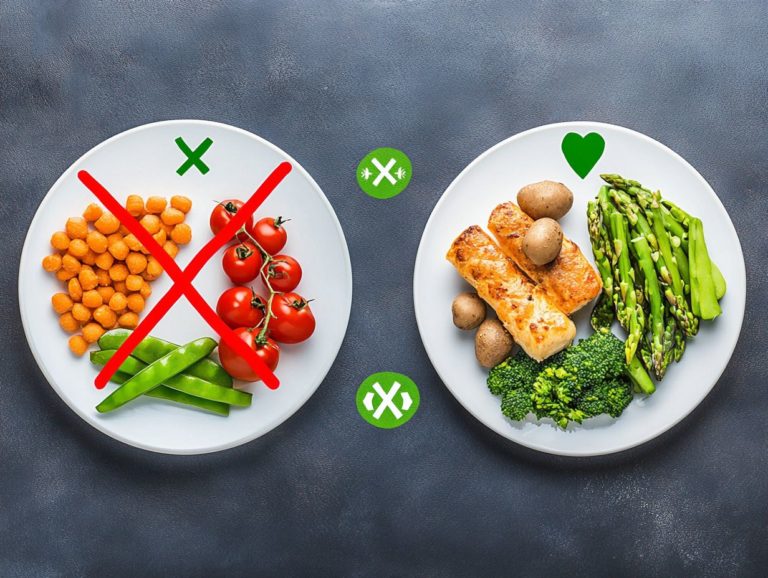The 5 Biggest Myths About Nutritional Supplements
Navigating the realm of nutritional supplements can feel overwhelming, particularly with the multitude of options at your fingertips and the tide of information some of it accurate and much of it misleading.
You might find yourself reaching for supplements in hopes of enhancing your health, but it s vital to understand that misconceptions are rampant. This article will clarify the five biggest myths surrounding supplements, revealing the truths about their regulation, effectiveness, and role in a balanced diet.
You’ll also gain insights into the different types of supplements, their potential risks, and thoughtful ways to incorporate them into your lifestyle. Are you ready to uncover the truth? Let s dive in.
Contents
- Key Takeaways:
- 1. Supplements Are Not Regulated by the FDA
- 2. All Supplements Are Created Equal
- 3. Supplements Are a Quick Fix for Poor Nutrition
- 4. You Can Take As Many Supplements As You Want
- 5. Supplements Can Replace a Balanced Diet
- What Are Nutritional Supplements and How Do They Work?
- Frequently Asked Questions
Key Takeaways:

- Not all supplements are created equal, and the FDA does not regulate them. It’s important to do research and consult with a healthcare professional before taking any supplements.
- Supplements are not a quick fix for poor nutrition. They should complement a healthy diet and lifestyle, not replace them.
- It s unsafe to take an unlimited amount of supplements. Overconsumption can lead to harmful side effects and interactions with other medications.
1. Supplements Are Not Regulated by the FDA
Dietary supplements, such as super greens and others, exist in a realm not overseen by the Food and Drug Administration (FDA). This lack of regulation raises valid concerns about the health claims made by manufacturers and the overall safety of these products for American adults.
Without this oversight, significant risks arise for consumers like you, who might think these products have undergone rigorous testing for both effectiveness and safety. The enticing health claims on packaging can easily mislead you into believing you’re making well-informed choices.
Research from the Council for Responsible Nutrition highlights that the rise of supplements, including omega-3 fatty acids (healthy fats important for heart health) and vitamin D, aims to address common nutritional deficiencies. However, there is often little evidence to support their advertised benefits.
In this landscape of uncertainty, it s essential for you to carefully examine product labels and consult health professionals to avoid potentially harmful or ineffective supplements.
2. All Supplements Are Created Equal
It’s a common misconception that all dietary supplements are created equal. The truth is that their effectiveness can vary significantly based on formulation, ingredients, and your specific nutritional needs.
Take herbal remedies, for example; they can provide diverse benefits and potential side effects compared to essential vitamins like B12 and D, which play crucial roles in energy production and bone health.
Super greens, often rich in antioxidants and phytonutrients (beneficial compounds found in plants), might be just what you need for a convenient boost in your fruit and vegetable intake.
Choosing the right supplement requires more than just personal preference; it s essential to assess your unique health profile and thoroughly research each product. This thoughtful approach ensures that you make informed decisions aligned with your wellness goals, ultimately leading to more effective supplementation.
3. Supplements Are a Quick Fix for Poor Nutrition
Many individuals believe that dietary supplements can serve as a quick fix for nutritional gaps. However, it’s vital to understand that these supplements should complement a balanced diet, not replace the whole foods that provide essential nutrients.
Whole foods think fruits, vegetables, whole grains, and lean proteins offer a wealth of vitamins, minerals, and antioxidants that work together to support your overall health. This diverse nutrient profile fills dietary gaps and plays a vital role in preventing deficiencies that can lead to various health issues.
While supplements like omega-3 fatty acids and vitamin K can certainly enhance your dietary intake and provide specific benefits, they cannot replicate the intricate interactions and advantages found in whole food sources. The unique phytonutrients and fiber in these foods are integral to promoting optimal health, underscoring the necessity of prioritizing a well-balanced diet rich in variety.
4. You Can Take As Many Supplements As You Want

Many believe you can take as many supplements as you want, but that’s a myth. Going overboard can lead to health risks. Excessive intake may cause issues with nutrient absorption and even vitamin toxicity, especially from fat-soluble vitamins like A, D, E, and K.
These risks are real and can lead to health complications. For instance, too much magnesium may cause digestive issues and affect your heart. It’s crucial to find a balance because your body needs specific amounts of nutrients to function well.
By sticking to established dietary guidelines, you can get your vitamins and minerals from food, which provides a natural balance and added benefits. It s crucial to consult healthcare professionals before adding supplements to your routine. Personalized advice can help you avoid health risks associated with excessive intake, ensuring your well-being is prioritized.
5. Supplements Can Replace a Balanced Diet
Many mistakenly think that supplements can replace a balanced diet, but they can’t replicate the unique blend of nutrients and benefits found in whole foods.
Research shows that while supplements can deliver certain nutrients, they often miss the synergistic effects that whole foods provide. For example, fruits and vegetables are rich in fiber, phytonutrients, and antioxidants, which work together to enhance overall health and reduce disease risk.
The myths about supplements suggest they can easily fill dietary gaps, but this oversimplifies nutrition s complexities. Studies reveal that relying solely on supplements can create imbalances and lead to health issues.
Embracing dietary diversity not only enhances your meals but also supports your overall wellness in a more effective way.
What Are Nutritional Supplements and How Do They Work?
Nutritional supplements are products designed to boost your diet by providing essential vitamins, minerals, and other natural substances that benefit your health.
Whether you want to strengthen your immune system, increase energy, or improve digestion with probiotics and enzymes, these supplements have something for you.
Vitamins play key roles, enhancing skin health and boosting immunity. Minerals like zinc and magnesium are essential for many body functions, aiding muscle recovery and hormone balance.
Probiotics, the good bacteria, support gut health and may improve digestion, reducing the risk of gastrointestinal issues.
Herbal remedies, rooted in centuries of tradition, offer many benefits, from easing anxiety to reducing inflammation. Scientific literature often supports these claims, showing how these compounds interact with your body and contribute to your wellness.
What Are the Different Types of Nutritional Supplements?
Nutritional supplements come in various types, including:
- Vitamins: A, C, and D are essential for boosting immunity and skin health. B vitamins support energy metabolism and cognitive function.
- Minerals: Calcium and magnesium are vital for strong bones and muscle function.
- Herbal remedies: Echinacea and ginseng support overall wellness and specific conditions like stress or fatigue.
- Specialty formulations: Omega-3 fatty acids are known for their heart health benefits.
These supplements can effectively fill nutritional gaps and improve health outcomes for you.
What Are the Risks and Side Effects of Taking Supplements?

Supplements can provide health benefits, but they also come with risks. Be aware of vitamin toxicity and potential interactions with medications. This highlights the importance of cautious and informed use.
The risks associated with supplements can vary from person to person. Individual health conditions and the specific combinations of supplements taken play a major role.
For instance, overindulging in fat-soluble vitamins, such as A, D, E, and K, can lead to serious toxicity issues. Some herbal supplements may also interfere with prescription medications, leading to unintended side effects.
This emphasizes the necessity of consulting with healthcare professionals before starting any supplement regimen. They can provide tailored advice based on your dietary needs and health status, ensuring your approach is both safe and effective.
How Can One Determine If They Need Supplements?
Determining whether you need dietary supplements starts with assessing your individual nutritional needs. Identify any dietary gaps and understand the potential health benefits. This process is often guided by dietary guidelines and consultations with healthcare professionals.
To effectively evaluate your needs, begin with a comprehensive dietary assessment. Track your daily food intake to pinpoint any missing nutrients. It s essential to consider your specific health conditions. Certain medical issues may heighten your body’s requirements for particular vitamins or minerals.
For example, vitamins D and B12 are important for maintaining energy levels and supporting immune function. A deficiency in these can lead to significant health concerns.
Utilizing resources from the National Institutes of Health is a smart move. They provide valuable insights into recommended dietary allowances, helping you identify critical gaps in your nutrition.
What Are the Most Common Myths About Supplements?
Common myths surrounding dietary supplements can easily mislead you. Many believe that more is always better or that supplements can completely substitute a healthy diet. To navigate these misconceptions, it’s important to understand the top 10 myths about dietary guidelines debunked, as this information helps clarify the genuine health claims you should rely on.
Such misconceptions can warp your understanding of energy enhancement. You might think that simply taking a couple of pills will magically boost your stamina, overlooking the critical role of balanced nutrition and regular exercise.
The belief that weight loss can be easily achieved through supplements is misleading. Sustainable weight management is rooted in lifestyle changes, including a nutritious diet and physical activity.
You can recognize that supplements aren t necessary for everyone. Many individuals can derive ample nutrients from a well-rounded diet. Consulting with healthcare professionals and reputable sources can provide clearer guidance on effective supplementation tailored to your needs.
How Can One Incorporate Supplements into a Healthy Lifestyle?
Incorporating dietary supplements into your healthy lifestyle requires understanding your health goals and nutritional needs. Maintain a balanced diet that optimizes nutrient absorption and supports your immune system.
To maximize the benefits of these supplements, consider factors such as timing, optimal dosage, and the right food pairings that can elevate their effectiveness. For example, taking fat-soluble vitamins with a meal rich in healthy fats can significantly enhance absorption.
If your focus is on muscle recovery, integrating protein powders post-workout may serve you well. Those aiming for improved digestion might find that taking probiotics on an empty stomach works wonders.
By aligning specific supplements, such as omega-3 fatty acids or vitamin D, with your dietary preferences, you can achieve your targeted health milestones. This thoughtful approach ensures that every element of your routine works in harmony to promote your overall well-being.
Are you ready to boost your health? Consult a healthcare professional to assess your supplement needs!
Frequently Asked Questions

What are the 5 biggest myths about nutritional supplements?
The 5 biggest myths about nutritional supplements are:
1. Supplements are a quick fix for a poor diet.
Don’t fall for the myth that supplements can replace real food your health deserves better!
2. All supplements are created equal.
Not all supplements provide the same benefits. Factors like ingredient quality matter!
3. You can take as much as you want without any negative effects.
This is dangerous! Some nutrients have limits that should never be exceeded.
4. Supplements are only for athletes or bodybuilders.
This is a common misconception. Supplements can enhance health for everyone!
5. You don’t need supplements if you eat a balanced diet.
While it’s true you can get nutrients from food, supplements can help when it s tough to meet your needs.
Can supplements replace a healthy diet?
No, they can’t! Supplements can provide extra nutrients, but they should complement a healthy, balanced diet, not replace it.
Are all supplements created equal?
No, they are not! The quality and effectiveness of a supplement depend on the source of ingredients and manufacturing processes.
Can I take as many supplements as I want without negative effects?
No, excessive intake can be harmful! Some nutrients have a recommended daily allowance (RDA) and a tolerable upper intake level (UL) that you shouldn’t exceed.
Do I need supplements if I eat a balanced diet?
You can meet your daily nutrient needs with a balanced diet, but it can be tough for some people. Supplements can be great for those with deficiencies or specific health conditions.
Are supplements only for athletes or bodybuilders?
No, that’s a myth! Supplements can benefit everyone, regardless of age or activity level, and can support overall health.






